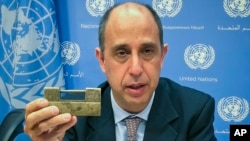The United Nations independent expert on human rights for North Korea has welcomed political talks and denuclearization efforts, but urged that the human rights situation not be forgotten.
"The human rights situation at the moment has not changed on the ground in North Korea, despite this important progress on security, peace and prosperity," Special Rapporteur Tomas Ojea Quintana told reporters Tuesday ahead of his briefing to the U.N. General Assembly committee that deals with human rights issues.
Ojea said the "reality" is that the nuclear issue is "extremely serious" and that human rights had been put on a back burner, but at some point, Pyongyang must signal that it will discuss human rights.
"It is the time for North Korea to show commitment to the human rights agenda," he said. "We have seen nothing from North Korea in this respect."
Ojea also called for access to the country, which rejects his mandate and has not allowed him to visit.
In 2014, a U.N. panel wrote an exhaustive report on North Korea's human rights situation. It found systematic, widespread and grave violations of rights rising to potential crimes against humanity.
"The gravity, scale and nature of these violations reveal a state that does not have any parallel in the contemporary world," the Commission of Inquiry said at the time. The panel said such crimes against humanity were the result of "policies established at the highest level of State."
Abuses included murder, enslavement, torture, imprisonment, rape, forced abortions, sexual violence, enforced disappearance of persons, and the act of knowingly causing prolonged starvation.
Tensions on the Korean Peninsula have decreased dramatically in the past year. Starting with North Korea's participation in last February's winter Olympics in South Korea, which led to three separate summits between the leaders of those two countries. In June, President Donald Trump met with North Korean leader Kim Jong Un in Singapore. Trump has said he plans to hold a second summit with Kim soon.
Speaking of the U.S.-DPRK summit, Ojea said there were some "confusing statements" on whether human rights had been addressed. He said the issues of the repatriation of the remains of U.S. soldiers and the release of U.S. prisoners in Pyongyang are human rights issues, but that there must be a discussion about the situation of ordinary North Korean citizens.
UN Expert on Human Rights Welcomes Thaw on Korean Peninsula

UNITED NATIONS —



